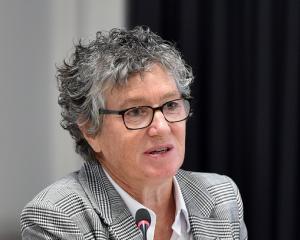An $810,000 Marsden Fund grant will help University of Otago geologist Associate Prof Daphne Lee gain revolutionary new insights into a lost world of ancient insects, preserved in kauri amber.
It was one of 22 grants gained by Otago University researchers, and totalling almost $14million, in the latest Marsden Fund round, which supports curiosity-driven research.
In a successful funding round, Otago researchers gained 25% of the overall $55.65 million allocated nationally, up from $13 million last year and behind only Auckland University ($15.2million, 27.3%).
Prof Lee was ''absolutely delighted'' to gain the grant, which she said would help reveal a ''treasure trove'' of unknown ancient insect species, preserved as fossils but previously hidden in the opaque kauri amber.
''I just have no idea what's in the next piece [of amber] that I pick up.''
Kauri trees have been growing in New Zealand for about 80million years.
Many insects and other creatures attracted to sticky kauri sap falling on the ground have found it hard to escape, and some have eventually been preserved as fossils inside the solidified kauri amber.
Marsden Fund officials said New Zealand amber was abundant in coal and other sediments, but was opaque and was previously thought to lack fossils.
That view was about to be ''radically changed'' by the new Marsden-funded project, led by Prof Lee and Dr Dallas Mildenhall, of GNS Science, Lower Hutt.
A recent pilot study had already revealed a ''remarkable number of new species'', including ''exquisitely preserved organisms such as spiders and their webs, pseudoscorpions, mites, midges, wasps'' and other creatures, organisers said.
Prof Lee said such ''amber biota'' would ''revolutionise our understanding of the role of evolution, extinction and environmental change'' in the formation of New Zealand's forest ecosystems.
Gaining the Marsden funding meant the international team could continue its work uncovering a ''fantastic'' array of previously unknown insects from New Zealand's ancient past.
The team also includes postdoctoral fellow Dr Uwe Kaulfuss, and Dr Jon Lindqvist, both of the Otago geology department.
Playing a key role is Dr Alexander Schmidt, of the Amber Research Group at Goettingen University, Germany, who has developed a new method of making opaque New Zealand amber translucent so fossils become visible.
The Otago deputy vice-chancellor, research and enterprise, Prof Richard Blaikie, was ''delighted'' with the success of Otago's latest Marsden recipients, across a wide range of academic disciplines, in this year's ''highly competitive'' funding round.
The following other Otago researchers gained grants: Dr Boris Baeumer, Dr Mihaly Kovacs, both mathematics and statistics, $565,000; Prof Richard Jackson, National Centre for Peace and Conflict Studies, $595,000; Associate Prof Ian Barber, anthropology and archaeology, $720,000; Prof Judy Bennett, history and art history, $710,000; Dr Stephen Bunn, Dr Andrew Clarkson, both anatomy, each $773,000; Associate Prof Ruth Empson, Dr Rebecca Campbell, both physiology, each $820,000; Dr Peter Fineran, microbiology and immunology, $773,000; Dr Sian Halcrow, anatomy, $720,000; Prof Steven Higgins, botany, $808,000; Prof Robert Poulin, Dr Bruce Robertson, Prof Jon Waters, all three zoology, respectively, $790,000 and the latter two, $808,000 each; Associate Prof Mark Hampton, pathology, Christchurch, $815,000. Fast-Start grants, each $300,000: Dr Monica Gerth, biochemistry, Dr Travis Ingram, zoology; Dr Karl Iremonger, physiology; Dr Catherine Smith, applied sciences; Dr Steven Smith, geology; Dr Ting Wang, mathematics and statistics.
Marsden Fund
• Otago University researchers gained 22 contracts and more than $13.9m in grants.
• Latest funding was up from about $13m received last year, and amounted to 25% of the $55.65m awarded nationally.
• Researchers from across Otago University's divisions of health sciences, humanities and sciences will lead 16 new standard projects and six ''Fast-Start'' projects.
• Auckland University gained $15.2m, through 28 research contracts (27.3% of overall funding).
• The Marsden Fund is administered for the Government by the Royal Society of New Zealand.












